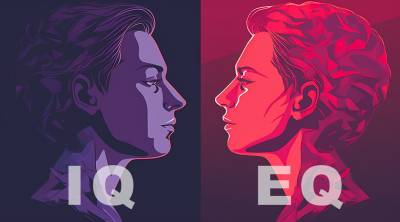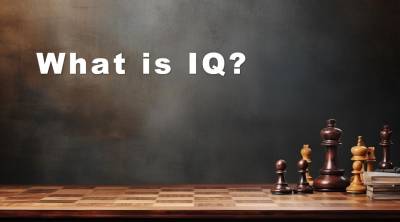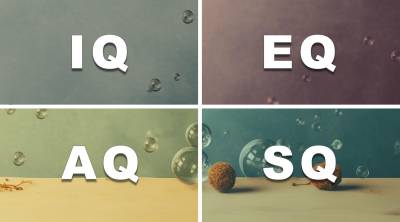IQ Test History

IQ tests, which measure how people think and solve problems, have changed a lot over time. They started out as a basic tool for understanding our brain's abilities. Now, they're used all over the world, even though some people have different opinions about them. We're going to look at how IQ tests came to be, who made important changes to them, and how they've grown and changed over the years.
Origins of Intelligence Concepts (Ancient Times - Enlightenment)
Before the advent of formal intelligence testing, our ancestors grappled with the enigmatic concept of intelligence, seeking to unravel its essence and significance. In this chapter of our exploration, we delve into the historical roots of intelligence concepts, where philosophical musings and cultural interpretations sowed the seeds of our modern understanding.
1. Philosopher's Quest: Intellectual Inquiries in Ancient Greece

In ancient Greece, the birthplace of Western philosophy, esteemed thinkers such as Socrates, Plato, and Aristotle contemplated the nature of intelligence. Their dialogues and writings delved into the realms of reason, knowledge, and wisdom, painting a vivid tapestry of early interpretations.
"Knowing yourself is the beginning of all wisdom." - Socrates
2. Eastern Wisdom: Ancient Philosophies from the Far East

While the Greeks pondered, parallel intellectual pursuits were taking place in the Far East. Ancient Chinese philosophers, including Confucius and Laozi, explored the concept of wisdom and the balance of yin and yang as elements of intelligence. The Indian subcontinent birthed ancient texts like the Vedas and the Upanishads, which contemplated the nature of consciousness and self-realization.
3. Mesopotamian Metrics: Numerical Aptitude in Ancient Babylonia

Beyond philosophical inquiries, ancient civilizations like Babylonia in Mesopotamia exhibited a practical application of intelligence. The development of complex mathematical systems, astronomy, and architectural feats highlighted the importance of numerical aptitude as a marker of intellectual prowess.
The Babylonians' ability to calculate astronomical phenomena paved the way for advanced civilizations in astronomy and mathematics.
4. Cultural Conceptions: Wisdom and Intelligence Across Civilizations
Intelligence was not confined to philosophical discourse or mathematical wizardry. Diverse cultures across the globe developed their own unique interpretations. In Native American cultures, spiritual intelligence and an individual's connection to nature were revered. In African societies, oral traditions and storytelling were central to the transmission of knowledge and wisdom.
Sir Francis Galton's Contributions (Late 19th Century)

In the late 19th century, amidst the intellectual fervor of scientific inquiry, a remarkable figure emerged - Sir Francis Galton. Known for his pioneering contributions to various fields, Galton's work left an indelible mark on the realm of intelligence testing.
Unveiling the Genius of Sir Francis Galton
Picture this: a polymath, a cousin of Charles Darwin, and an inquisitive mind thirsty for understanding the mysteries of human intelligence. Sir Francis Galton, through his extensive research and deep fascination with the inheritability of traits, brought forth innovative ideas that challenged the status quo.
The Eugenics Visionary
Galton's research ventured into the realm of eugenics, a term he coined to describe the study of improving human hereditary traits. He believed that intelligence, like other characteristics, could be inherited. His exploration into the heritability of intelligence led to groundbreaking theories and controversial discussions that still resonate today.
"The question was, who shall be considered worthy?... I have no patience with the hypothesis occasionally expressed... that babies are born pretty much alike and that the sole agencies in creating differences between boy and boy, and man and man, are steady application and moral effort." - Sir Francis Galton
The Birth of Psychometrics
Galton's work laid the groundwork for the field of psychometrics, the scientific measurement of human psychological traits. One of his notable contributions was the development of statistical techniques to study human characteristics, including intelligence. He pioneered the use of statistical analysis to explore patterns and correlations in data, opening up new avenues of understanding within the realm of intelligence assessment.
From Anthropometric Measurements to Mental Testing
Galton's ideas extended beyond theoretical frameworks. He sought practical means to measure intelligence and developed methods such as anthropometric measurements to assess physical characteristics associated with cognitive abilities. His work fueled the curiosity of future scholars, inspiring them to further explore the intricate connection between physical attributes and mental prowess.
Tables of Genius and Brains of Brilliance
In his quest to unravel the mysteries of intelligence, Galton conducted extensive data collection and analysis. He meticulously compiled tables of geniuses, documenting the achievements and intellectual capacities of individuals across various fields. Through these tables, he sought to identify patterns and uncover the characteristics of exceptional intellectual abilities.
"Every one knows, in the abstract, that scientific pursuits have religious, moral, and aesthetic aspects, but multitudes of persons know it as a vague and indefinite opinion only." - Sir Francis Galton
Legacy and Controversies
Galton's contributions were undeniably influential, setting the stage for subsequent advancements in intelligence testing. However, it is important to acknowledge the controversies surrounding his ideas, particularly his connection to eugenics. The ethical implications of his work continue to spark debates to this day.
The Binet-Simon Scale (Early 20th Century)

Imagine yourself in the early 20th century, a time of intellectual exploration and scientific curiosity. It is within this backdrop that we encounter two visionaries, Alfred Binet and Theodore Simon, whose groundbreaking work forever transformed the landscape of intelligence assessment.
The Quest for a Measuring Tool
In the early 1900s, Paris became the epicenter of intellectual inquiry, providing the perfect breeding ground for minds yearning to unlock the secrets of intelligence. Alfred Binet, a brilliant psychologist, and Theodore Simon, a dedicated physician, set out on a joint quest to develop a novel assessment tool that would measure a person's intellectual abilities. Their partnership would prove to be an intellectual force to be reckoned with, as they embarked on a mission that would forever change the landscape of psychology.
"The scale is only a tool; it is the psychologist who must interpret it." - Alfred Binet
Crafting the Binet-Simon Scale
Through meticulous observation and a profound understanding of child development, Binet and Simon crafted a series of tests that assessed different aspects of intellectual functioning. They focused on tasks that required problem-solving, reasoning, attention, memory, and language skills. By tailoring the tests to match the mental abilities expected at different ages, they laid the foundation for the concept of mental age.
Their scale consisted of a series of progressively challenging tasks, where children were evaluated based on their performance relative to their chronological age. If a child's performance matched the expectations of an average child of a higher age group, their mental age was considered advanced.
The Impact and Legacy
The Binet-Simon Scale quickly gained recognition and became an invaluable tool for identifying children who required additional educational support. It allowed educators to assess a child's intellectual capabilities and tailor instruction accordingly, challenging the notion that intelligence was fixed or immutable. This groundbreaking approach was a transformative departure from the prevailing belief that intelligence was solely determined by hereditary factors.
"A few modern philosophers assert that an individual's intelligence is a fixed quantity, a quantity which cannot be increased. We must protest and react against this brutal pessimism." - Alfred Binet
The Evolution of Intelligence Testing
The Binet-Simon Scale served as a catalyst for further research and development in the field of intelligence testing. It laid the groundwork for subsequent revisions and adaptations, leading to the creation of renowned scales such as the Stanford-Binet Intelligence Scales and the Wechsler Intelligence Scales.
Today, we stand on the shoulders of these early pioneers, recognizing their indelible impact on our understanding of human intelligence. The Binet-Simon Scale represents not only a remarkable scientific achievement but also a testament to the power of collaboration and innovation in advancing our knowledge of the human mind.
"It is on the foundation of a solid scientific basis that we will build the edifice of education." - Alfred Binet
The Emergence of the Intelligence Quotient (Early 20th Century)
In the early 20th century, a remarkable development unfolded in the realm of intelligence testing - the emergence of the term 'Intelligence Quotient' (IQ). This milestone can be attributed to the pioneering work of German psychologist William Stern, who left an indelible mark on the field of psychological assessment.
In the early 1900s, psychologists around the world were grappling with the need for a standardized measure of intelligence. Amidst this intellectual ferment, William Stern stepped onto the stage and introduced a revolutionary concept - the Intelligence Quotient. Stern's idea was simple yet ingenious - to calculate an individual's IQ by dividing their mental age by their chronological age and multiplying the result by 100.
"The mental age divided by the chronological age, multiplied by 100 - this is how we can understand intelligence!" - William Stern
Stern's formulation not only provided a numerical value to represent intelligence but also enabled comparisons between individuals of different ages. This breakthrough allowed psychologists to assess cognitive abilities across the lifespan, from childhood to adulthood.
To illustrate the significance of Stern's contribution, let's consider an example. Imagine a child with a mental age of 10 and a chronological age of 8. Applying Stern's formula, their IQ would be (10 ÷ 8) × 100 = 125. This numeric representation provided a concise and standardized way of quantifying intelligence.
Stern's Intelligence Quotient gained popularity rapidly, becoming a widely accepted measure of intelligence in psychological research and practice. This concept took root and spread like wildfire, offering a common language to discuss and compare cognitive abilities.
As the usage of IQ tests grew, Stern's formula became an integral part of the testing landscape. The Intelligence Quotient became a benchmark against which individuals could be evaluated, allowing psychologists to make meaningful assessments and predictions about an individual's cognitive capabilities.
| IQ Score Range | Classification |
|---|---|
| Below 70 | Intellectually Disabled |
| 70-79 | Borderline |
| 80-89 | Low Average |
| 90-109 | Average |
| 110-119 | High Average |
| 120-129 | Superior |
| 130-144 | Gifted |
| 145 and above | Highly Gifted |
Today, Stern's concept of the Intelligence Quotient continues to shape our understanding of intelligence testing. Although critics have raised concerns about the limitations and cultural biases of IQ tests, the term 'Intelligence Quotient' remains deeply embedded in the field, sparking ongoing research and debates.
IQ Testing in World Wars (1914-1945)

In the tumultuous era of the World Wars, IQ tests emerged as instruments of cognitive scrutiny on an unprecedented scale. These psychometric assessments were not confined to classrooms or clinics but were strategically employed to decipher the intellectual aptitude of recruits on the battlefields. Join us on this riveting expedition as we explore the role and impact of IQ tests during World War I and II, unearthing tales of strategic placement, mental fortitude, and the intriguing interplay between minds and war machines.
World War I: Alpha and Beta Tests
As the clamor of war engulfed nations, military authorities faced the challenge of efficiently allocating personnel to various roles. Enter the Alpha and Beta tests, developed by psychologist Robert Yerkes and his team, which aimed to identify the mental capacities of soldiers.
"The army wants men whose minds are flexible, who can think quickly and well, who can learn rapidly, and who have good memories." - Robert Yerkes
The Alpha test, a written examination, gauged verbal and numerical abilities, while the Beta test, with its nonverbal tasks, was suitable for individuals with limited English proficiency. These tests provided insights into recruits' cognitive capabilities, assisting in role assignment and strategic decision-making.
World War II: The Dawn of Group Intelligence Testing
Building on the foundations laid during World War I, World War II saw the rise of group intelligence tests. Recognizing the need for efficient assessment methods, the Army General Classification Test (AGCT) became a game-changer. This timed examination measured verbal, numerical, and abstract reasoning skills, serving as a compass to navigate recruits towards specialized military vocations.
"IQ testing allowed the military to identify individuals with exceptional cognitive abilities and assign them to intelligence or specialized technical units." - Military Historian, Dr. James Arnold
The AGCT not only facilitated rapid placement but also played a crucial role in identifying individuals with exceptional cognitive abilities, often earmarking them for intelligence or specialized technical units.
The Impact: Sharpening the Arsenal of Minds
The impact of IQ testing on the battlefield was profound. By efficiently matching skills to roles, military strategists harnessed the collective intellectual potential of their troops, maximizing their operational effectiveness. The knowledge garnered from IQ tests helped create units comprising highly skilled specialists, such as codebreakers and analysts, who played pivotal roles in deciphering enemy communications and enhancing strategic decision-making.
The Legacy of Minds Tested
The World Wars, with their unforgiving nature, propelled IQ testing to the forefront of military selection and placement. These assessments provided valuable insights into the cognitive abilities of soldiers, shaping the battlefield with a new understanding of minds at war. The legacy of IQ testing in the context of warfare remains an intriguing chapter in the broader narrative of psychological assessment, reminding us of the intricate dance between intellect and combat.
The Wechsler Scales (Mid-20th Century)
In the mid-20th century, the stage was set for a symphony of intelligence assessment. Enter David Wechsler, a psychologist whose name would become synonymous with the pinnacle of IQ testing. With the creation of his eponymous scales, Wechsler composed a masterpiece that continues to resonate in the field of psychological evaluation to this day.
The Birth of a Visionary
David Wechsler, a man of astute observation and innovative thinking, revolutionized IQ testing by introducing a more comprehensive approach. His scales, designed for different age groups, embraced a symphony of verbal and non-verbal assessments, capturing the multifaceted nature of human intelligence. Wechsler's visionary stance allowed individuals' cognitive strengths to shine through, providing a more nuanced understanding of their intellectual capabilities.
"It is not enough to measure how well a person can recite the dictionary; we must also gauge their ability to dance with words." - David Wechsler
The Wechsler Adult Intelligence Scale (WAIS)
The crescendo of Wechsler's symphony arrived with the creation of the Wechsler Adult Intelligence Scale (WAIS). Introduced in 1955 and revised several times since, the WAIS became a cornerstone of intelligence assessment for adults aged 16 to 90. It captured a range of cognitive abilities through various subtests, such as information, digit span, and similarities. The WAIS provided a comprehensive profile of an individual's intellectual strengths and weaknesses, helping professionals make informed decisions in clinical, educational, and occupational settings.
| WAIS Subtests | Description |
|---|---|
| Information | Measures general knowledge and cultural literacy. |
| Digit Span | Assesses working memory and attention. |
| Similarities | Evaluates verbal abstract reasoning. |
| and more... |
Wechsler Intelligence Scale for Children (WISC)
Building upon his success with the WAIS, Wechsler created the Wechsler Intelligence Scale for Children (WISC). This masterpiece, introduced in 1949 and revised over time, catered to the unique cognitive development of children aged 6 to 16. Through subtests like picture completion, coding, and comprehension, the WISC unraveled the tapestry of youthful intelligence, providing valuable insights into a child's cognitive strengths and areas for growth.
Wechsler Preschool and Primary Scale of Intelligence (WPPSI)
Wechsler's symphony reached its crescendo with the creation of the Wechsler Preschool and Primary Scale of Intelligence (WPPSI). This harmonious composition, introduced in 1967, extended the age range of assessment to include children aged 2.5 to 7 years. The WPPSI delicately measured cognitive abilities through tasks such as block design, picture naming, and matrix reasoning, painting a vivid picture of a child's intellectual prowess at a tender age.
A Lasting Symphony of Legacy
David Wechsler's contributions to IQ testing resonate to this day, harmonizing the field of intelligence assessment. His scales, the WAIS, WISC, and WPPSI, continue to provide professionals with invaluable tools to unlock the melodies of cognitive abilities across the lifespan. Wechsler's visionary approach, blending verbal and non-verbal assessments, has enriched our understanding of intelligence and shaped the path of psychological evaluation.
Controversies and Critiques (Late 20th Century - Present)
IQ testing, like any influential concept, has not been immune to criticism and controversy. From the late 20th century to the present day, a chorus of voices has questioned the validity, fairness, and implications of these tests. In this exploration, we will shine a light on the multifaceted debates and discussions surrounding IQ testing, unpacking the concerns raised, and examining the impact they have had on our understanding of intelligence.
Exposing Biases with a Critical Tone
One of the most contentious aspects surrounding IQ testing has been the question of cultural bias. Critics argue that traditional IQ tests favor individuals from certain cultural and socio-economic backgrounds, inadvertently perpetuating inequality. They claim that these tests fail to capture the diverse ways in which intelligence manifests across different communities and overlook the importance of cultural nuances.
"Culture fair tests can never be developed because mental tests, like any other human artifacts, inevitably reflect the experiences and values of a particular culture." - Stephen Jay Gould
Analyzing the Bell Curve Controversy
No discussion of IQ testing controversies would be complete without delving into the storm stirred by "The Bell Curve," a book published in 1994 by Richard Herrnstein and Charles Murray. The authors sparked fierce debates by suggesting that IQ scores were influenced by genetic factors and argued that differences in average IQ scores between racial and ethnic groups were partly responsible for societal disparities. The book ignited a firestorm of arguments, with many scholars criticizing its methodology, interpretations, and potential consequences on social policies.
Presenting Alternative Perspectives with a Balanced Tone
Amidst the controversies, a counterpoint has emerged. Some argue that IQ tests, despite their imperfections, provide valuable insights into cognitive abilities and can be useful tools in certain contexts. They highlight that these tests have undergone rigorous development, standardization, and extensive validation processes. Moreover, they suggest that IQ scores correlate with various real-world outcomes, such as academic achievement and job performance, albeit imperfectly.
"No test is perfect, but when used thoughtfully and appropriately, IQ tests can provide valuable information for understanding cognitive abilities." - American Psychological Association
Addressing the Broader Scope with an Analytical Tone
Beyond cultural biases and the Bell Curve controversy, discussions surrounding IQ testing have also delved into the limitations of these tests. Critics argue that they fail to capture the full spectrum of human intelligence, disregarding creative, emotional, and practical aspects. They advocate for a broader understanding of intelligence that acknowledges multiple intelligences and emphasizes a holistic assessment of an individual's capabilities.
Closing with a Call for Ongoing Reflection
As controversies continue to simmer, it is essential to approach IQ testing with a critical eye. Recognizing its limitations while acknowledging its potential, we must strive for continuous research and development, refining the tools we use to assess intelligence. By fostering open dialogue and a multidimensional understanding of human abilities, we can transcend the controversies and work towards a more comprehensive perspective on intelligence.
Modern Perspectives (Present)

In the realm of psychological evaluation, the perception and utilization of IQ testing have witnessed a kaleidoscope of change in the present era. Today, we embark on a captivating exploration of how IQ testing is viewed and employed, shedding light on its multifaceted applications and embracing the revolutionary concept of multiple intelligences.
The Traditional Standpoint: A Measuring Yardstick
Traditionally, IQ testing has been viewed as a valuable tool for assessing cognitive abilities and predicting academic success or job performance. Many institutions, such as schools and employers, rely on IQ scores to evaluate individuals' intellectual aptitude. The concept of a single, general intelligence, often measured through standardized tests, has been prominent in such contexts.
"The true sign of intelligence is not knowledge but imagination." - Albert Einstein
Expanding the Horizon: Multiple Intelligences
In recent decades, a paradigm shift has occurred, embracing the concept of multiple intelligences. This framework, popularized by Howard Gardner, challenges the notion of a singular intelligence and recognizes diverse cognitive strengths and abilities in individuals. Gardner proposed various intelligences, including linguistic, logical-mathematical, spatial, musical, bodily-kinesthetic, interpersonal, intrapersonal, and naturalistic intelligence.
"We are all capable of knowing more than we are taught." - Doris Lessing
Applications in Education: Nurturing Varied Talents
Educators have embraced the concept of multiple intelligences to foster inclusive and personalized learning environments. By recognizing and harnessing the diverse strengths of students, teachers can tailor their instructional strategies to accommodate various intelligences. For example, linguistic intelligence may thrive in language-rich activities, while bodily-kinesthetic intelligence may excel in hands-on, experiential tasks.
| Intelligence | Characteristics | Example |
|---|---|---|
| Linguistic | Skilled in language, verbal communication, and written expression. | A student who excels in writing essays and enjoys reading. |
| Logical-Mathematical | Strong problem-solving and analytical skills, adept at reasoning and logical thinking. | An individual who excels in math and enjoys puzzles. |
| Spatial | Proficient in visualizing and manipulating objects in space, skilled in art and design. | An artist who creates intricate paintings or sculptures. |
| Musical | Exhibits a high sensitivity to sounds, rhythms, and melodies, excels in musical expression. | A musician who effortlessly plays multiple instruments. |
| Bodily-Kinesthetic | Possesses excellent motor skills and body coordination, excels in physical activities. | An athlete who performs exceptional gymnastics routines. |
| Interpersonal | Skilled in understanding and connecting with others, excels in social interactions. | A leader who effortlessly builds strong relationships with teammates. |
| Intrapersonal | Deep self-awareness, introspection, and understanding of one's own emotions and thoughts. | A person who spends time reflecting on personal values and goals. |
| Naturalistic | Highly attuned to and appreciative of the natural world, excels in understanding nature. | A biologist who studies ecosystems and wildlife conservation. |
Beyond Academia: Professional and Personal Contexts
IQ testing finds applications beyond education, particularly in occupational settings. Employers may employ IQ tests as part of their recruitment process to assess candidates' problem-solving abilities and overall cognitive competence. Additionally, IQ scores can provide individuals with valuable insights into their strengths and areas for improvement, helping them make informed decisions about career paths and personal development.
A Dynamic Future Beckons
As we navigate the modern landscape of IQ testing, the concept of multiple intelligences breathes fresh air into our understanding of human potential. By acknowledging and nurturing diverse cognitive abilities, we pave the way for a more inclusive society. While IQ tests remain valuable tools, their interpretations are evolving, embracing a broader tapestry of intelligences. So, let us embrace this dynamic future, where the multifaceted nature of human intelligence takes center stage.
Sources:
- Yerkes, R. M., & Adams, J. A. (1917). Army mental tests. Memoirs of the National Academy of Sciences, 15(1), 1-12.
- Kevles, D. J. (1986). Testing the Army's Intelligence: Psychology, Selection, and Classification in World War I. Journal of American History, 73(4), 1059-1083.
- Arnold, J. R. (2015). The Development of Army Group Intelligence Testing and Its Implications for Modern Selection of Army Personnel (Doctoral dissertation).





